 ★★★★
★★★★
“Smack my bitch up.”
 There are some films which I like, and where if you don’t agree with me, you are an idiot – such as Shaun of the Dead. However, there are movies where I can see, understand and accept why people dislike them, even if I may strongly disagree. Bitch Slap would be one of the latter. Looking at the the IMDb ballot results, the top number of voters have given it one out of ten. However, the next-most have given it 10/10. Between them, those two extremes represent more than 40% of the total votes. Much the same thing – albeit to a somewhat less rabidly-partisan degree – happened here in GwG Towers.
There are some films which I like, and where if you don’t agree with me, you are an idiot – such as Shaun of the Dead. However, there are movies where I can see, understand and accept why people dislike them, even if I may strongly disagree. Bitch Slap would be one of the latter. Looking at the the IMDb ballot results, the top number of voters have given it one out of ten. However, the next-most have given it 10/10. Between them, those two extremes represent more than 40% of the total votes. Much the same thing – albeit to a somewhat less rabidly-partisan degree – happened here in GwG Towers.
 Chris has a certain firmness of opinion. When she has made up her mind about something, it’s pretty hard to get her to change it. She will purse her lips, fold her arms and stick to her guns. You could argue whether this strong will is a character quality or a flaw, but it certainly led to her early exit from Bitch Slap. Here’s an approximate timeline of the comments from the seat on the couch next to me:
Chris has a certain firmness of opinion. When she has made up her mind about something, it’s pretty hard to get her to change it. She will purse her lips, fold her arms and stick to her guns. You could argue whether this strong will is a character quality or a flaw, but it certainly led to her early exit from Bitch Slap. Here’s an approximate timeline of the comments from the seat on the couch next to me:
- 5 minutes: “Would you rather watch this alone?”
- 5:30 minutes: “Are you sure you wouldn’t rather watch this alone?
- 10 minutes: “Is this a porno?”
- 20 minutes: “Could this get any more stereotypical?”
It was not long after this – I think it was when the lesbian canoodling started – she suddenly remembered she had a vitally-important task to perform elsewhere. Judging by the sounds emanating from our office, that task appeared to involve Facebook poker.
Of course, to me, complaining about the film being stereotypical is missing the point. It’s supposed to be a frothy melange of cliches, thrown into the cinematic melting-pot and the heat turned up to ‘High’. The opening credit sequence, with its clips of “bad girls” such as Tura Satana and Christina Lindberg, gives you some idea of what to expect, and it hardly pauses thereafter, growing increasingly more breathlessly frenetic. Not often have I seen a movie suffering from a more chronic case of Attention Deficit Hyperactivity Diso… Ooh, look! Shiny, pretty things!
Speaking of which, it centers on three women, with about as divergent personalities as it’s possible to imagine. There’s Hel (Cummings), a con-artist with a secret identity; the psychotic Camero (Olivio), who starts off the movie insane, yet somehow manages to get even more loopy as things progress; and, finally, Trixie (Voth), the “innocent” one, whom you’re not quite sure about. The heroic trio end up out in the desert, with Gage (Hurst) tied up in their trunk, seeking… Well, part of the plot revolves around that issue, so I’ll leave that out of the summary. From there, the story of how they reached that point is told in flashback, and event also unfold moving forward, as they try to locate their obscure object of desire before the infamous, deadly “Pinky” shows up.
Of course, it’s not as simple as that. Others are after the same prize, such as Hot Wire and his GoGo Yubari clone (Japanese, schoolgirl, killer yo-yo), Kinki (Minae Noji). There’s also a good deal of tension, sexual and otherwise, between the three heroines: are any of them quite what they seem? I imagine my usage of the phrase “secret identity” above might have given some of the game away there. It hardly counts as a spoiler either, to say that it all ends (eventually) in a brawl between Camaro and Hel, in the middle of a desolate wasteland, which has become steadily more wasted and bullet-ridden over the course of the movie.
The Laydeez of Bitch Slap
 |
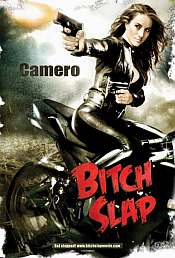 |
 |
 |
Director Jacobson certainly has a solid pedigree in the action-heroine world, at least at the televisual end of the spectrum. His resume includes episodes of La Femme Nikita, Cleopatra 2525, Xena: Warrior Princess and She Spies, a good number of which have a similarly self-parodying approach to their subject matter as seen here. However, while the excess is somewhat greater, this only really extends to some potty-mouth lines and digital blood. Despite all the tension and canoodling mentioned earlier, Cummings shows a lot more skin for Jaconson as the hero’s wife in Spartacus: Blood and Sand. If you’re going for camp excess, as appears to be the case, you need to be a good deal more…well, excessive.
 The main weak link is the leads, who don’t have the chops – physical or acting – to pull this off. I to wonder whether it might have been a good deal better if stunt co-ordinator Zoe Bell, Lucy Lawless and Renee O’Connor had been the stars of the film, rather than merely cameos. They have all previously shown the necessary combination of martial ability and screen presence necessary for the parts here. Not that the actresses here are “bad”: however, when you’re spitting out Satana-esque lines like, “Ram this in your clambake, bitch cake!” you’d better have the F-sized volume of charismatic fire-power to pull them off, and they fall short of the level needed for this to achieve classic status (Olivo probably comes closest to the necessary level of conviction, spitting our her dialogue with a perpetual sneer).
The main weak link is the leads, who don’t have the chops – physical or acting – to pull this off. I to wonder whether it might have been a good deal better if stunt co-ordinator Zoe Bell, Lucy Lawless and Renee O’Connor had been the stars of the film, rather than merely cameos. They have all previously shown the necessary combination of martial ability and screen presence necessary for the parts here. Not that the actresses here are “bad”: however, when you’re spitting out Satana-esque lines like, “Ram this in your clambake, bitch cake!” you’d better have the F-sized volume of charismatic fire-power to pull them off, and they fall short of the level needed for this to achieve classic status (Olivo probably comes closest to the necessary level of conviction, spitting our her dialogue with a perpetual sneer).
Having got those criticisms out of the way, the rest of the film is very solid entertainment – providing, as noted above, you can get your brain lined-up with what it’s trying to do (and if you can’t, which is understandable, it’s basically unsalvageable). Alcohol will probably help the neurons go in the correct direction, as will an encyclopaedic knowledge of pop culture, and tolerance for trash at an industrial concentration. The litmus test is probably the slow-motion water-fight which breaks out among the three laydeez early on: if you greet that with a smirk of guilty pleasure (as charged, m’lud), rather than, oh, bailing for the Facebook poker lobby, you’ll probably be fine.
Jacobsen also does a good job with the visual style, providing a perfect match for the lurid, frenetic approach of the script and character. There’s a lot of green screen work, which lends proceeding a hyperreal feeling, and the pace means that there’s hardly a dull moment. Not sure the storyline makes a great deal of sense, I admit, and it feels as overstuffed as a giant bean burrito (you know the kind, the ones you regret buying about one-third of the way through, but just can’t stop yourself from finishing). The fractured plotline has been compared to Tarantino, but personally, there’s a good deal less annoying self-indulgence than Quentin usually inflicts on the audience: for example, Camero doesn’t bring things to a grinding halt, just to witter on about comic-books.
All told, it’s refreshing to see something which is so avowedly politically-incorrect, and proud of it. The film is at its best when wallowing in the gutter, unashamedly down and dirty, and with a broad grin upon its face – credit to all those involved for having the guts not give a damn about the nay-sayers and one-voters. It’s not going to trouble the more-evolved areas of your brain very much, and will tug on the heartstrings even less, but for the times when you don’t want anything more than the cinematic equivalent of a one-night stand, this will certainly do the job perfectly well. Certainly the most full-on, and arguably the best, of the genre to come out of Hollywood in the past five years.
Dir: Rick Jacobson
Star: Julia Voth, America Olivo, Erin Cummings, Michael Hurst























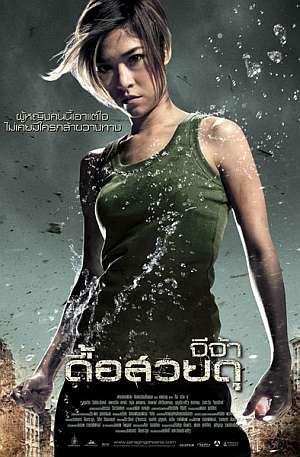 If you’ve seen Chocolate – starring the same lead actress, though confusingly billed under a different name here – you’ll know what to expect, and the film delivers much of the same. Which would be stunning, brutal fight scenes combined with moments of mind-numbing tedium. The plan for Yanin’s career seems to be to contrive methods by which she can avoid acting: last time it was autism; here, it’s a drunken style of kung-fu which helps mitigate a voice that might charitably be compared to broken nails on glass. She plays former rock-star(!) Deu, who is on the edge of being kidnapped, when she’s rescued by Sanim (Tang). He and his fellow masters of alcohol-fu have all lost ladies in their life to the kidnappers – who, it turns out, are doing this because… No. You wouldn’t believe me even if I told you – and are trying to locate their lair. Deu joins the team, and agrees to act as bait, to see if the kidnappers will go after her again.
If you’ve seen Chocolate – starring the same lead actress, though confusingly billed under a different name here – you’ll know what to expect, and the film delivers much of the same. Which would be stunning, brutal fight scenes combined with moments of mind-numbing tedium. The plan for Yanin’s career seems to be to contrive methods by which she can avoid acting: last time it was autism; here, it’s a drunken style of kung-fu which helps mitigate a voice that might charitably be compared to broken nails on glass. She plays former rock-star(!) Deu, who is on the edge of being kidnapped, when she’s rescued by Sanim (Tang). He and his fellow masters of alcohol-fu have all lost ladies in their life to the kidnappers – who, it turns out, are doing this because… No. You wouldn’t believe me even if I told you – and are trying to locate their lair. Deu joins the team, and agrees to act as bait, to see if the kidnappers will go after her again. ★★★★
★★★★ The second series of TLC’s “mommy cops” reality series struck close to home, centered as it was on Phoenix. It didn’t come as much surprise as our local sheriff, Joe Arpaio, is infamous locally as a media whore, who wastes no opportunity for self-promotion, and is a sharply-divisive figure locally, adored and loathed by about equal parts of the population. We wondered how long it would take before Joe slimed his way onto the screen: six minutes into the first episode, we had our answer. Fortunately, this was more of a blip, and our fears of an Arpaio-centered show proved largely unfounded [see the execrable Smile… You’re Under Arrest for how bad this could have been].
The second series of TLC’s “mommy cops” reality series struck close to home, centered as it was on Phoenix. It didn’t come as much surprise as our local sheriff, Joe Arpaio, is infamous locally as a media whore, who wastes no opportunity for self-promotion, and is a sharply-divisive figure locally, adored and loathed by about equal parts of the population. We wondered how long it would take before Joe slimed his way onto the screen: six minutes into the first episode, we had our answer. Fortunately, this was more of a blip, and our fears of an Arpaio-centered show proved largely unfounded [see the execrable Smile… You’re Under Arrest for how bad this could have been]. As notable as what is shown, is what was
As notable as what is shown, is what was  Finally, there’s Detective Deborah Moyer (right), who is completely marvellous, and the main reason to watch the show. A 19-year veteran, we’d be entirely happy if the show was 100% about her. While the other women occasionally seem very scripted when they are talking to the camera, that isn’t the case with Moyer: there’s a definite sense that what you see is what you get with her. While her policing style may not be “by the book” – in one episode, she basically arrests a teenage girl for failing to hug her father – her reactions are entirely natural and certainly had us nodding in approval more often than not. She just comes across as being very normal: when she encounters a young perpetrator, she tends to think about her own kids of the same age.
Finally, there’s Detective Deborah Moyer (right), who is completely marvellous, and the main reason to watch the show. A 19-year veteran, we’d be entirely happy if the show was 100% about her. While the other women occasionally seem very scripted when they are talking to the camera, that isn’t the case with Moyer: there’s a definite sense that what you see is what you get with her. While her policing style may not be “by the book” – in one episode, she basically arrests a teenage girl for failing to hug her father – her reactions are entirely natural and certainly had us nodding in approval more often than not. She just comes across as being very normal: when she encounters a young perpetrator, she tends to think about her own kids of the same age.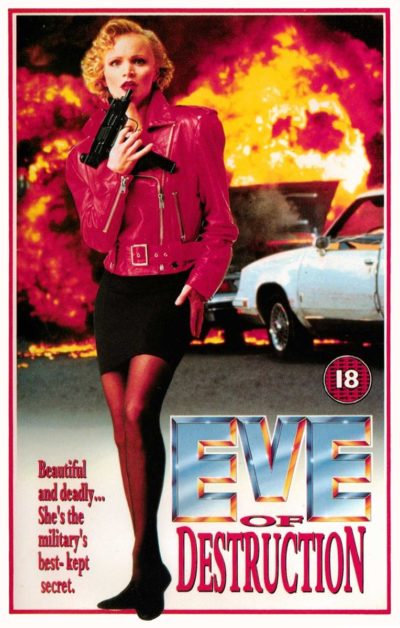 While undeniably a product of its time – which would be 1991 – this has stood the test of time very well, and remains a solid piece of action SF. Eve Simmons (Soutendijk) is a researcher working for the US government on creating life-like robots for surveillance missions, and her creation, Eve VIII, not only looks like her, but has her memories and psychology too. When on a test run in San Francisco, Eve VIII is caught up in a bank robbery and a bullet sends her off the grid, and on her own mission. Jim McQuade (Hines), something like a proto-Jack Bauer, is brought in to track down the lost little robot, who has all of her creator’s complexes, but none of the social restraints, leading to a fondness for automatic weapons, which she uses with abandon as she works out her psychiatric issues [cheaper than counselling, and a good deal more fun]. Oh, and Eve VIII also has a nasty little surprise package tucked away inside. It’s up to McQuade and Simmons to stop the killing machine before things
While undeniably a product of its time – which would be 1991 – this has stood the test of time very well, and remains a solid piece of action SF. Eve Simmons (Soutendijk) is a researcher working for the US government on creating life-like robots for surveillance missions, and her creation, Eve VIII, not only looks like her, but has her memories and psychology too. When on a test run in San Francisco, Eve VIII is caught up in a bank robbery and a bullet sends her off the grid, and on her own mission. Jim McQuade (Hines), something like a proto-Jack Bauer, is brought in to track down the lost little robot, who has all of her creator’s complexes, but none of the social restraints, leading to a fondness for automatic weapons, which she uses with abandon as she works out her psychiatric issues [cheaper than counselling, and a good deal more fun]. Oh, and Eve VIII also has a nasty little surprise package tucked away inside. It’s up to McQuade and Simmons to stop the killing machine before things 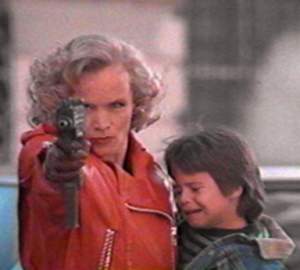 But as a straightforward B-movie, it works nicely, with Hines having a nicely sardonic wit: “A spinach lasagne, in a light tomato and basil sauce,” is the reply, when Simmons asks dubiously what is McQuade’s “specialty” as a government agent. I’m still trying to work out if the film is feminist or chauvinist: you could read it either way, with the ‘liberated’ (if robotic) woman a free spirit, though the ending firmly puts Even back in her place, to say the least. She also emasculates one man, somewhat familiar territory for Soutendijk, who previously wielded a scissors to leg-crossing effect in The Fourth Man. Gibbins, meanwhile, died in the 1993 Hollywood fires, while trying to rescue a cat. Guess there’s never an unstoppable robot around when you really need one.
But as a straightforward B-movie, it works nicely, with Hines having a nicely sardonic wit: “A spinach lasagne, in a light tomato and basil sauce,” is the reply, when Simmons asks dubiously what is McQuade’s “specialty” as a government agent. I’m still trying to work out if the film is feminist or chauvinist: you could read it either way, with the ‘liberated’ (if robotic) woman a free spirit, though the ending firmly puts Even back in her place, to say the least. She also emasculates one man, somewhat familiar territory for Soutendijk, who previously wielded a scissors to leg-crossing effect in The Fourth Man. Gibbins, meanwhile, died in the 1993 Hollywood fires, while trying to rescue a cat. Guess there’s never an unstoppable robot around when you really need one. We couldn’t wait for this one to get an official American release, so off to Ebay we went for a copy of uncertain origin. This was something of a double-edged sword. It means we get to tell you that this is, hands down,
We couldn’t wait for this one to get an official American release, so off to Ebay we went for a copy of uncertain origin. This was something of a double-edged sword. It means we get to tell you that this is, hands down, 
 If you enjoyed Planet Terror, you’ll likely get a kick out of this, which also combines elements of The Evil Dead, Kill Bill and Tetsuo the Iron Man into what has got to be the bloodiest movie of 2008. The life of Ami (Yashiro) is turned upside down when her brother and his friend are killed by school bullies under the control of a local gangster’s son (Nishihara). Ami sets out for revenge on all those responsible for the killings. But the Yakuza don’t take kindly to this and Ami finds herself with a count of functioning limbs that ends at three. Does that stop her? Of course not. Teaming up with the late friend’s mother Miki (Asami), whose husband happens to be an ace mechanic, Ami gets fitted with a machine-gun and the pair of vengeful vixens head off for a return match.
If you enjoyed Planet Terror, you’ll likely get a kick out of this, which also combines elements of The Evil Dead, Kill Bill and Tetsuo the Iron Man into what has got to be the bloodiest movie of 2008. The life of Ami (Yashiro) is turned upside down when her brother and his friend are killed by school bullies under the control of a local gangster’s son (Nishihara). Ami sets out for revenge on all those responsible for the killings. But the Yakuza don’t take kindly to this and Ami finds herself with a count of functioning limbs that ends at three. Does that stop her? Of course not. Teaming up with the late friend’s mother Miki (Asami), whose husband happens to be an ace mechanic, Ami gets fitted with a machine-gun and the pair of vengeful vixens head off for a return match. Yashiro’s background is in…well, what could politely be described as ‘bikini videos’, not action movies, but her performance here is respectable enough. Probably more impressive are Asami, and Honoka, who plays the wife of the Yakuza boss. They both, too, come from the adult industry, possessing an impressive feral intensity which reminded me of Brigitte Lahaie in Fascination, and is entirely in keeping with the grindhouse feel of the entire enterprise. You could argue that the trailer contains everything you need to see, in a more concentrated form, and I wouldn’t argue with that, or if you said this was no more than a porn variant, where nothing matters except the money shots of body fluids getting sprayed everywhere. Still, we had a blast, and the film fully lives up to the sleeve description, delivering the “One-Armed Ballistic Assault Heroine” it promises, in spades.
Yashiro’s background is in…well, what could politely be described as ‘bikini videos’, not action movies, but her performance here is respectable enough. Probably more impressive are Asami, and Honoka, who plays the wife of the Yakuza boss. They both, too, come from the adult industry, possessing an impressive feral intensity which reminded me of Brigitte Lahaie in Fascination, and is entirely in keeping with the grindhouse feel of the entire enterprise. You could argue that the trailer contains everything you need to see, in a more concentrated form, and I wouldn’t argue with that, or if you said this was no more than a porn variant, where nothing matters except the money shots of body fluids getting sprayed everywhere. Still, we had a blast, and the film fully lives up to the sleeve description, delivering the “One-Armed Ballistic Assault Heroine” it promises, in spades.
 Let’s start off by giving us a heroine who is dying, thanks to an inoperable brain tumour. Way to bring me down, Juncture: what do you think this is? DamesWithDiseases.com? The Hallmark channel is tha…oh, hang on. She’s following a child-porn purchaser back to his house, and guns him down? Hmmm. This is clearly not your everyday Illness of the Week flick. For Anna Carter (Blackport) has decided to go out with a bang: several of them, in fact. Realising she only has a short time to live, she decides to extend her day-job as the co-ordinator for a charitable foundation, and correct the failings of a justice system: neglectful mothers, drunk drivers, selfish CEOs, they’re all likely to meet impeccably-dressed vengeance.
Let’s start off by giving us a heroine who is dying, thanks to an inoperable brain tumour. Way to bring me down, Juncture: what do you think this is? DamesWithDiseases.com? The Hallmark channel is tha…oh, hang on. She’s following a child-porn purchaser back to his house, and guns him down? Hmmm. This is clearly not your everyday Illness of the Week flick. For Anna Carter (Blackport) has decided to go out with a bang: several of them, in fact. Realising she only has a short time to live, she decides to extend her day-job as the co-ordinator for a charitable foundation, and correct the failings of a justice system: neglectful mothers, drunk drivers, selfish CEOs, they’re all likely to meet impeccably-dressed vengeance. Still, there’s a great deal to admire here, with every penny being squeezed out of the budget. Particular kudos to cinematographer Richard Lerner and composer Neal Acree, whose efforts enhance proceedings significantly – the results look to be the product of a significantly-higher budget, than the rumoured million dollars. It leaves you questioning what you would do in the same situation: follow Queen Latifah off on a Last Holiday, or head for the dark side, as Anna does here, with a mission for what you perceive as the ‘greater good’? Certainly more thought-provoking than usual, it’s intended as the first part on a trilogy, though stands fairly well on its own, I would be very interested to see how things proceed from here, as Anna heads towards closure, both personal and medical.
Still, there’s a great deal to admire here, with every penny being squeezed out of the budget. Particular kudos to cinematographer Richard Lerner and composer Neal Acree, whose efforts enhance proceedings significantly – the results look to be the product of a significantly-higher budget, than the rumoured million dollars. It leaves you questioning what you would do in the same situation: follow Queen Latifah off on a Last Holiday, or head for the dark side, as Anna does here, with a mission for what you perceive as the ‘greater good’? Certainly more thought-provoking than usual, it’s intended as the first part on a trilogy, though stands fairly well on its own, I would be very interested to see how things proceed from here, as Anna heads towards closure, both personal and medical. ★★★★★
★★★★★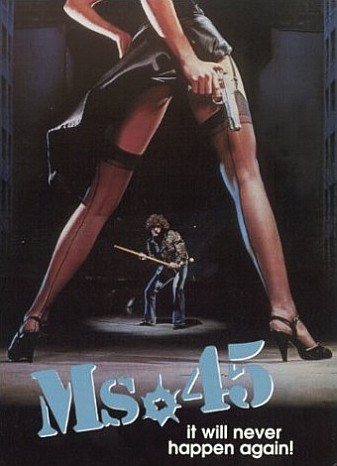
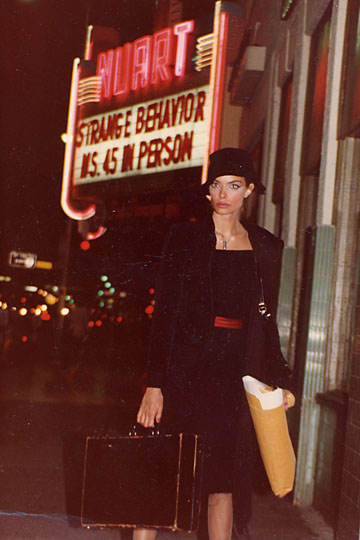 Hmm. While I can acknowledge the political subtext in Thana’s muteness [especially since it appears largely to be psychological, going by the last scene], I’m not quite sure how seriously I take this claim overall, given Ferrara actually plays one of the rapists, and a large percentage of the time is spent objectifying and fetishizing his lead actress, to the extent where Chris felt she looked like a supporting actress in a Robert Palmer video. Perhaps the most memorably instance of this is Thana, dressing up as a nun – but one that also wears stocking and suspenders – before heading out to a Halloween party. With her blood-red lipstick, she kisses each of the bullets before loading them into her gun, a sequence which tells us much about Ferrara’s repressed Catholicism [also apparently rampant in Lieutenant, where both Ferrara and Lund worked on the script], as well as paying homage to the other great New York street-sweeper, Travis Bickle from Taxi Driver.
Hmm. While I can acknowledge the political subtext in Thana’s muteness [especially since it appears largely to be psychological, going by the last scene], I’m not quite sure how seriously I take this claim overall, given Ferrara actually plays one of the rapists, and a large percentage of the time is spent objectifying and fetishizing his lead actress, to the extent where Chris felt she looked like a supporting actress in a Robert Palmer video. Perhaps the most memorably instance of this is Thana, dressing up as a nun – but one that also wears stocking and suspenders – before heading out to a Halloween party. With her blood-red lipstick, she kisses each of the bullets before loading them into her gun, a sequence which tells us much about Ferrara’s repressed Catholicism [also apparently rampant in Lieutenant, where both Ferrara and Lund worked on the script], as well as paying homage to the other great New York street-sweeper, Travis Bickle from Taxi Driver.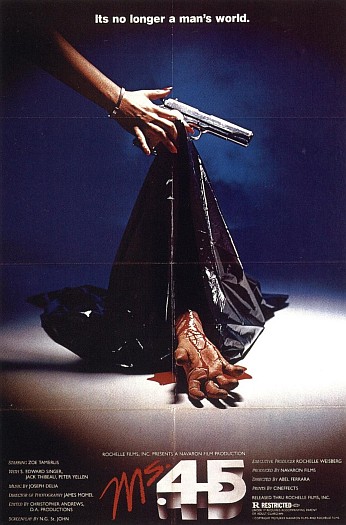 There are certainly holes in the plot logic. Where is Thana getting all the bullets from, and why is she such a crack-shot, despite presumably having never having handled a gun before? Yet these are in step with the pitch-black tongue-in-cheek humour the film contains: witness the long, rambling monologue inflicted on Thana by a guy she meets in a bar [her muteness making her the ultimate good listener]. I laughed like a
There are certainly holes in the plot logic. Where is Thana getting all the bullets from, and why is she such a crack-shot, despite presumably having never having handled a gun before? Yet these are in step with the pitch-black tongue-in-cheek humour the film contains: witness the long, rambling monologue inflicted on Thana by a guy she meets in a bar [her muteness making her the ultimate good listener]. I laughed like a